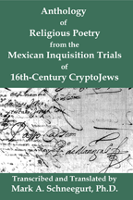Centuries ago, the Jewish people scattered across the world because of the Spanish Inquisition, which forced them to leave thousands of their religious works behind. Mark Schneegurt, a professor of biological sciences, has translated these texts in his latest publication “Anthology of Religious Poetry from the Mexican Inquisition Trials of 16th Century CryptoJews.”
Crypto-Judaism came about from the unplanned diaspora that occurred when the Catholic faith spread. The practice of Judaism became a criminal act, forcing those who continued to practice into hiding, pretending that they believed in Catholicism. They created their own hymns and writings to replace those left behind. Unfortunately, many Jews were unable to stay hidden, and were sentenced to death.
Schneegurt was not raised in an Orthodox Jewish family, but he now practices on his own. He decided to pursue the translation of these works after reading about Luis de Carajal while researching for his book detailing important Jewish holidays, "Everyday Holiday". Prior to “Anthology,” he had translated 100 poems written by German Jewish poet, Ephraim Moses Kuh. To aid in Spanish translation for "Anthology," Schneegurt enlisted the help of his friend, Norman Bent.
Many of the poems focus on repentance. The poets felt that they were being punished, due to the torture and persecution they faced in Mexico. Schneegurt explained they believed that if they were “more fervent that they would be shown favor from the Lord.” The poem “Cantico 9” helps envision the struggle of keeping the faith. English and Spanish versions follow.
My weak breath strives and strengthens,
my hoarse chest clears and brings joy,
my understanding shines and illuminates,
touch my soul, language and will,
and my heart also because it begins
with new force and new power,
to ask you for relief and to call you
the Lord, for to know to glorify you…
Mi flaco aliento esfuerca y fortalesce,
mi ronco pecho aclara y da alegría,
mi entendimiento alumbra y esclaresce,
toca mi alma, lengua y albedrio,
y el coracon, también porque comience
con nueva fuerza y nuebo poderío,
a pedirte socorro y a llamarte Dios, para saber glorificarte ...
Schneegurt also encountered the obstacle of jumping into a history project with no academic background in the subject. The bibliographic nature of this project is something not many scholars would be eager to pursue, Schneegurt said. Searching and translating is viewed as, “the boring part to them. To me it was exciting.” He was able to see the significance of the documents, and knew that “Anthology” would be crucial for further studies of the Mexican CryptoJews.
Schneegurt sees great potential in “Anthology,” yet is in no rush to profit off of this work. To him, the value of the work is more important than individual gain.
“This isn't about making money, this is about preserving these religious writings,” Schneegurt said, “and not just preserved but appreciated and proliferated.”
“Anthology” could become a peer-reviewed published work, yet exploring the “performative” aspect of the poetry by doing a dramatic reading of the poems, in Spanish, on stage may be the next step. Schneegurt has no plans for such a reading yet.
“It's the voices of martyrs; they died for their religion,” Schneegurt said. “This is how they kept their religion alive. There's just something holy about these works.”



